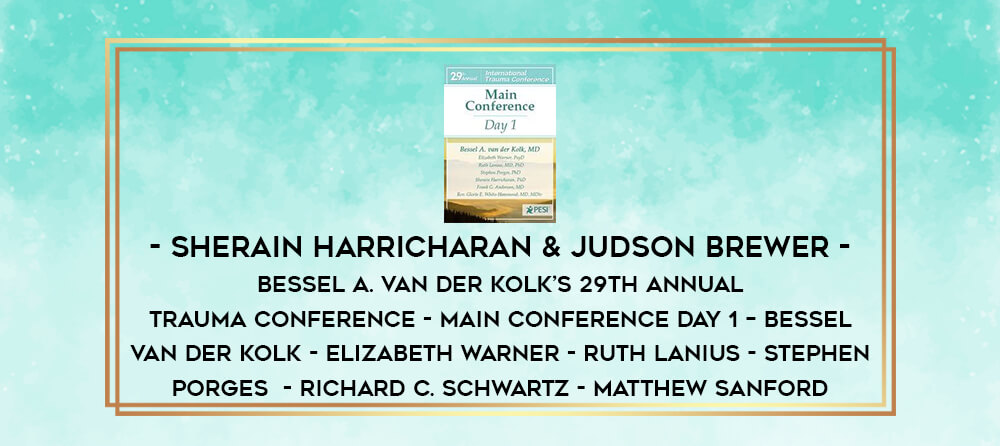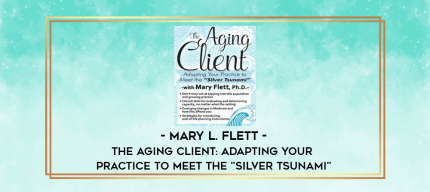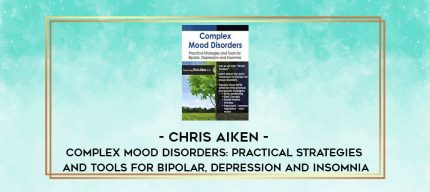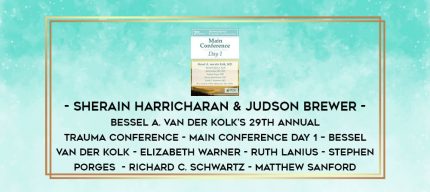Course Description
Sherain Harricharan & Judson Brewer – Bessel A. van der Kolk’s 29th Annual Trauma Conference – Main Conference Day 1 – Bessel Van der Kolk – Elizabeth Warner – Ruth Lanius – Stephen Porges – Richard C. Schwartz – Matthew Sanford

Sherain Harricharan & Judson Brewer – Bessel A. van der Kolk’s 29th Annual Trauma Conference – Main Conference Day 1 – Bessel Van der Kolk – Elizabeth Warner – Ruth Lanius – Stephen Porges – Richard C. Schwartz – Matthew Sanford
The study of trauma has probably been the single most fertile area in helping to develop a deeper understanding of the relationship among the emotional, cognitive, social and biological forces that shape human development. Starting with post-traumatic stress disorder (PTSD) in adults and expanding into early attachment and overwhelming attachment and social experiences in childhood (-Developmental Trauma), this endeavor has elucidated how certain experiences can -set psychological expectations and biological selectivity.
When addressing the problems of traumatized people who, in a myriad of ways, continue to react to current experience as a replay of the past, there is a need for therapeutic methods that do not depend exclusively on drugs or cognition. We have learned that most experience is automatically processed on a subcortical level of the brain; i.e., by -unconscious interpretations that take place outside of conscious awareness. Insight and understanding have only a limited influence on the operation of these subcortical processes, but synchrony, movement and reparative experiences do.
Workshops included in this recording:
- Trauma and Embodied Cognition – Bessel A. van der Kolk, MD
- The Effects of Traumatic Stress on Self-Experience: Balance, Perception & Sensory Integration – Sherain Harricharan, PhD, Elizabeth Warner, PsyD & Ruth Lanius, MD, PhD
- The Psychological Processing of Traumatic Experience: Self-Awareness, Interoception & Memory Processing – How (and How Well) Does EMDR Actually Work? – Ruth Lanius, MD, PhD, Matthew Sanford & Bessel A. van der Kolk, MD
- The Craving Mind: Why We Get Stuck in Habits & How Mindfulness Helps Us Get Unstuck – Judson Brewer, MD, PhD
- Panel Discussion & Questions
- The Emergence of a Polygonal-Informed Therapy: How Music & Voice Contribute to Healing Following Trauma – Stephen W. Porges, PhD
- Internal Family Systems and the Psychotherapy of Self-Leadership: Self and Identity – Richard C. Schwartz, PhD
- Present an overview of the impact of trauma on the various parts of the brain, body and nervous system.
- Examine the nature of traumatic stress and evaluate the research of how exposure to extreme stress affects brain function.
- Explain how EMDR is used for processing traumatic memories as it relates to clinical practice.
- Explore how habits form, why they can be hard to overcome and the current research that can give clients hope that habits can change.
- Articulate the foundation of Polyvagal Theory as it relates to the clinical treatment of trauma.
- Adapt the IFS model into your clinical practice and accelerate healing for clients with PTSD.
- Identify, specify and clarify the protective parts of clients with trauma histories to help with assessment and treatment planning.
Get Bessel A. van der Kolk’s 29th Annual Trauma Conference: Main Conference Day 1 of author Bessel Van der Kolk , Elizabeth Warner , Ruth Lanius , Stephen Porges , Richard C. Schwartz , Matthew Sanford , Sherain Harricharan & Judson Brewer only price 79$
Trauma and Embodied Cognition – Bessel A. van der Kolk, MD
- What Trauma Looks Like
The Effects of Traumatic Stress on Self-Experience: Balance, Perception & Sensory Integration – Sherain Harricharan, PhD & Elizabeth Warner, PsyD
- The Importance of Balance in the Body
- Understanding the Vestibular System and its Relationship with Trauma
- Manifestation of Vestibular Neural Circuitry
- Engagement of the Vestibular System in Healthy Child Development
The Psychological Processing of Traumatic Experience: Self-Awareness, Interoception & Memory Processing – How (and How Well) Does EMDR Actually Work? – Ruth Lanius, MD, PhD, Matthew Sanford & Bessel A. van der Kolk, MD
- EMDR vs Fluoxetine vs Placebo Study Results
- The Foundation to the Sense of Self
- Understanding the Mental Time Traveler
- The Neuroscience of Eye Moments
The Craving Mind: Why We Get Stuck in Habits & How Mindfulness Helps Us Get Unstuck – Judson Brewer, MD, PhD
- Understanding the Mind of Addiction
- Reward and Self
- Mindfulness and Addiction from a Behavioral and Biological Perspective
- The Importance of Awareness
- Case Studies and Video Demonstrations
Panel Discussion & Questions
The Emergence of a Polygonal-Informed Therapy: How Music & Voice Contribute to Healing Following Trauma – Stephen W. Porges, PhD
- An Introduction to Polyvagal Theory
- Power and Importance of Voice, Music and Listening
- Understanding Frequencies and their Impact on Traumatized Persons
- Case Studies and Video Demonstrations
Internal Family Systems and the Psychotherapy of Self-Leadership: Self and Identity – Richard C. Schwartz, PhD
- How Internal Family Systems was Developed
- Introduction to our Multiple Parts and Self
- The 8 C’s of Self-Leadership
- The Two Big Realities of the IFS Model
- The Map of Internal Family Systems
- Understanding the Different Roles of our Parts
- Internal Family Systems used in Clinical Practice























Reviews
There are no reviews yet.